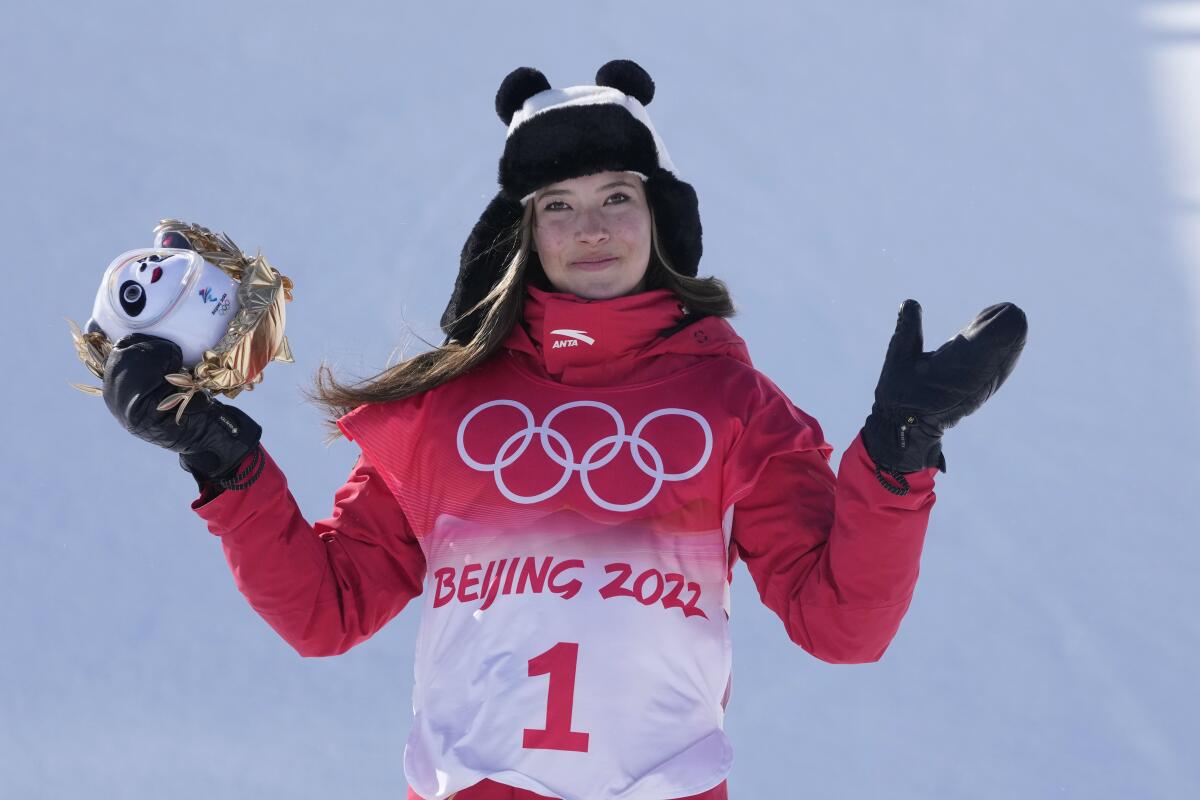Eileen Gu, the Olympics and who gets to be American

- Share via
I’ve watched the reactions to Eileen Gu, the Chinese American athlete who decided to ski for China this Olympics, with dismay and disgust.
It seems we can’t let an Olympics pass without wondering whether an Asian American athlete is truly American. Every four years, the Olympic team gets more diverse, and every four years, the American media fumbles for the words to describe them.
A New York Times profile of Gu wondered, breathlessly, “Is she American or is she Chinese?” She is obviously both.
Although Gu is one of many American athletes who choose to compete for other countries, her decision is being singled out as unpatriotic.
Never mind that that critique has never been applied to the scores of American athletes who compete for their home countries in the Olympics. Milwaukee Bucks star Giannis Antetokounmpo plays for Greece. Former Lakers champion Pau Gasol played for Spain. This Olympics, at least 15 other American athletes competed for other countries.
Commentators complain that Chinese authorities will use Gu to score political points on America. But what points those might be, and what they might be worth, is never fully articulated. Apparently, the United States and China are in some kind of popularity contest for athletic talent, and it’s bad for democracy and America if we lose, somehow.
And I had to laugh at the hand-wringing over the possibility that Gu may have considered that she could make more money in China as a result of her decision. Have you seen a Hollywood film in the last 20 years? Can you name a company that would not make more money in China if it could? What about the scores of American athletes who have sought work in China because they are worth more there? What about the $123.9 billion that Americans invested in China in 2020, according to Statista?
But when it comes to Eileen Gu, all of a sudden, capitalism and making money in China is unpatriotic?
What a bizarre turn of events. I thought this was America.
It’s incredible how much nationalistic posturing has been fueled by fantastical interpretations of Gu’s sparse, rehearsed media appearances. It’s as if commentators just relied on their own anti-Chinese sentiments to fill in the blanks.
I got a bit heated writing this and was starting to type harder than my keyboard would appreciate, so I decided to visit Vinh Hair Salon, an Asian American barbershop in Alhambra, to check in with some cooler heads.
I arrived to find Ben Tang and Jimmy Yim and all the barbers wearing American flag masks. It wasn’t about patriotism, Tang insists — those masks were just the cheapest ones. But they were all familiar with having to take steps to display their patriotism in order to get better treatment.
“If you do those things and you can be treated better, so you do them.”
Tang, Yim and the other guys I asked in the shop didn’t seem to have a problem with Gu’s decision. The patriotic thing to do, Tang said, would have been to ski for the U.S. But at the end of the day, everyone agreed that it was likely unspoken family dynamics driving the decision rather than an 18-year-old‘s national loyalties. Gu’s decision belongs to her and her family, everyone agreed.
Everyone I spoke to said that if they suddenly became very athletically talented, they would most certainly represent the United States. Tang says most of his Asian American clients love America, are extremely patriotic, and not big fans of the Chinese government. But they acknowledged that their family would probably play a role in their decision.
What was more concerning is that Gu’s decision to ski for China has arguably caused more strife than harmony. Rather than uniting fanbases in both countries, it has sparked a stream of vitriol from offended Americans. And that, everyone agreed, affected any Asian American who could be mistaken for Chinese.
“It’s great that she wants to help bring the countries closer together,” said Harmon, a longtime customer in Tang’s chair. “But one athlete isn’t really going to do very much.”
“There’s just going to be more anxiety over the U.S.-China thing, and that’s going to be more and more hate,” said a customer from the next chair.
“If anything,” Tang added, “this whole thing has made clear that things are pretty bad between the U.S. and China.”
But the problem with that situation isn’t Gu’s decision. It is the toxic nationalism and anti-Chinese sentiment that she has been greeted with.
Having a positive connection to your or your parents’ home country does not make you a traitor. I love America, but all my relatives live in Taiwan, so I also want Taiwan to do well so my family has a good life. That doesn’t make me any less of a patriot than any of you.
It’s a duality that any immigrant or child of immigrants is intimately familiar with. And though the muscular posturing of American foreign policy might not be able to handle that, it’s actually not such a hard concept.
For someone like Eileen Gu, it is likely as simple as loving both her mother and her father.
On her social media accounts, you can hear her code-switch effortlessly from Beijing-accented Mandarin to California-accented English. There’s a harmony between her Chinese and American cultural influences that our governments may never achieve. And in that I think there is hope.
Our governments may rattle sabers to satisfy our national egos, but our people don’t have to be at odds. We can fall in love, get married and have children like Eileen Gu.
Isn’t that what the Olympics were supposed to be about?
More to Read
Sign up for Essential California
The most important California stories and recommendations in your inbox every morning.
You may occasionally receive promotional content from the Los Angeles Times.














